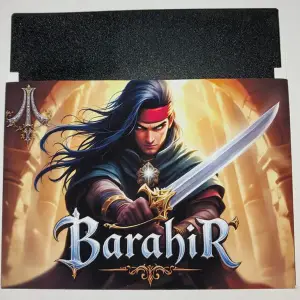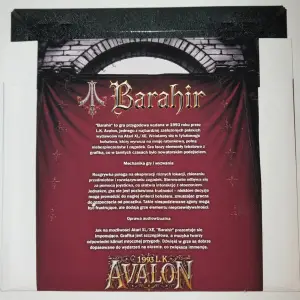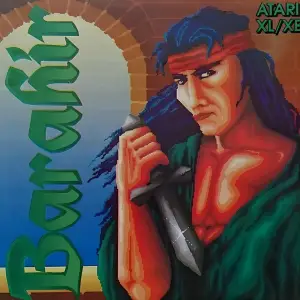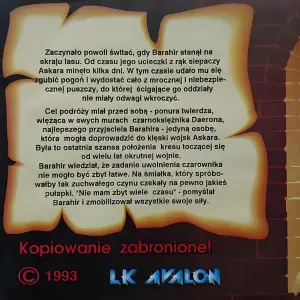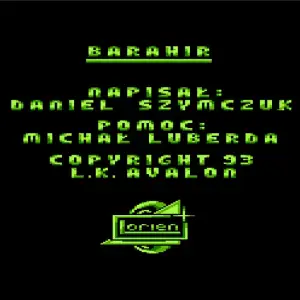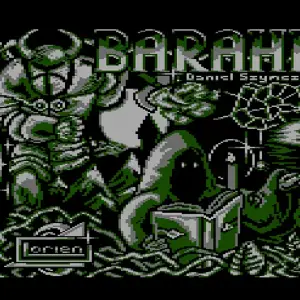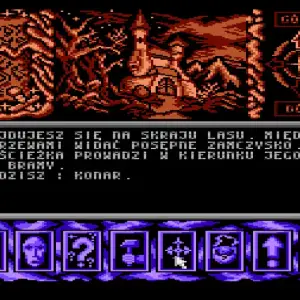Barahir: Polish Atari Adventure Classic
| Release Information | |
|---|---|
| Release Date | 1993 |
| Publishers | L.K. Avalon |
| Download Game files |
BARAHIR
Released in 1993 by L.K. Avalon and developed by Lorien, Barahir stands as one of the most iconic Polish games for the Atari XL/XE platform. It uniquely combines elements of a text-based adventure with graphical depictions of locations, making it a standout title in its genre. Despite the technological limitations of the era, the game was well-received by players and critics alike for its innovative approach and atmospheric presentation.
The story immerses players in a fantasy world where they take on the role of Barahir, a brave knight embarking on a rescue mission. The goal is to free the wizard Daeron, held captive in the fortress of Askar. While the storyline is rooted in classic fantasy themes, it has often been criticized for being somewhat generic and incomplete. The lack of detailed character motivations and the open-ended conclusion left players feeling as if the story was only a fragment of a larger narrative—perhaps hinting at a planned sequel that never materialized.
Gameplay in Barahir is structured into two layers. The upper portion of the screen features static images representing the locations the player explores, while the lower section displays text-based descriptions of events, surroundings, and available interactions. Players navigate using a compass rose, solving puzzles, interacting with objects, and engaging with characters. The joystick-controlled interface is intuitive, making the gameplay experience reminiscent of more advanced 16-bit adventure games.
Despite its engaging mechanics, such as the ability to converse with characters and restore health by consuming provisions, the game suffers from certain limitations. The locations, while well-drawn, lack color diversity and remain visually static regardless of interactions. Puzzles largely involve collecting and using items such as keys and levers, which can feel repetitive over time. Additionally, unexpected and unexplained deaths can frustrate players, as they often occur without any clear cause or warning, artificially extending the game’s difficulty.
The audio-visual presentation is a highlight of Barahir. While the graphics are static, they are atmospheric, and the soundtrack is exceptional. The music, inspired by Barry Leitch’s compositions, creates an unforgettable ambiance and perfectly complements the gameplay. The disk version includes additional audio tracks that maintain a high standard of quality and enhance the experience further.
At the time of its release, Barahir was seen as a groundbreaking title, earning the reputation of a "messiah of Atari gaming." However, from today’s perspective, its flaws, particularly in the areas of storytelling and gameplay variety, are more apparent. Nevertheless, it remains a significant title in the history of Polish Atari XL/XE games. It’s a must-play for retro gaming enthusiasts who want to experience a piece of gaming history that showcases the creativity and ingenuity of its developers.
For fans of classic adventures, Barahir offers a nostalgic journey back to a time when video games thrived on the imagination of their players and the innovation of their creators.
GAME SOUNDTRACK:

About Us

Ataricovers.com is a website dedicated to fans of classic Atari games. Our mission is to design new covers for old games, as well as to collect and share high-quality manuals and promotional materials related to Atari titles. Driven by passion and community involvement, we are building a unique archive that helps preserve and reimagine the legacy of this iconic brand for current and future generations of gamers.

